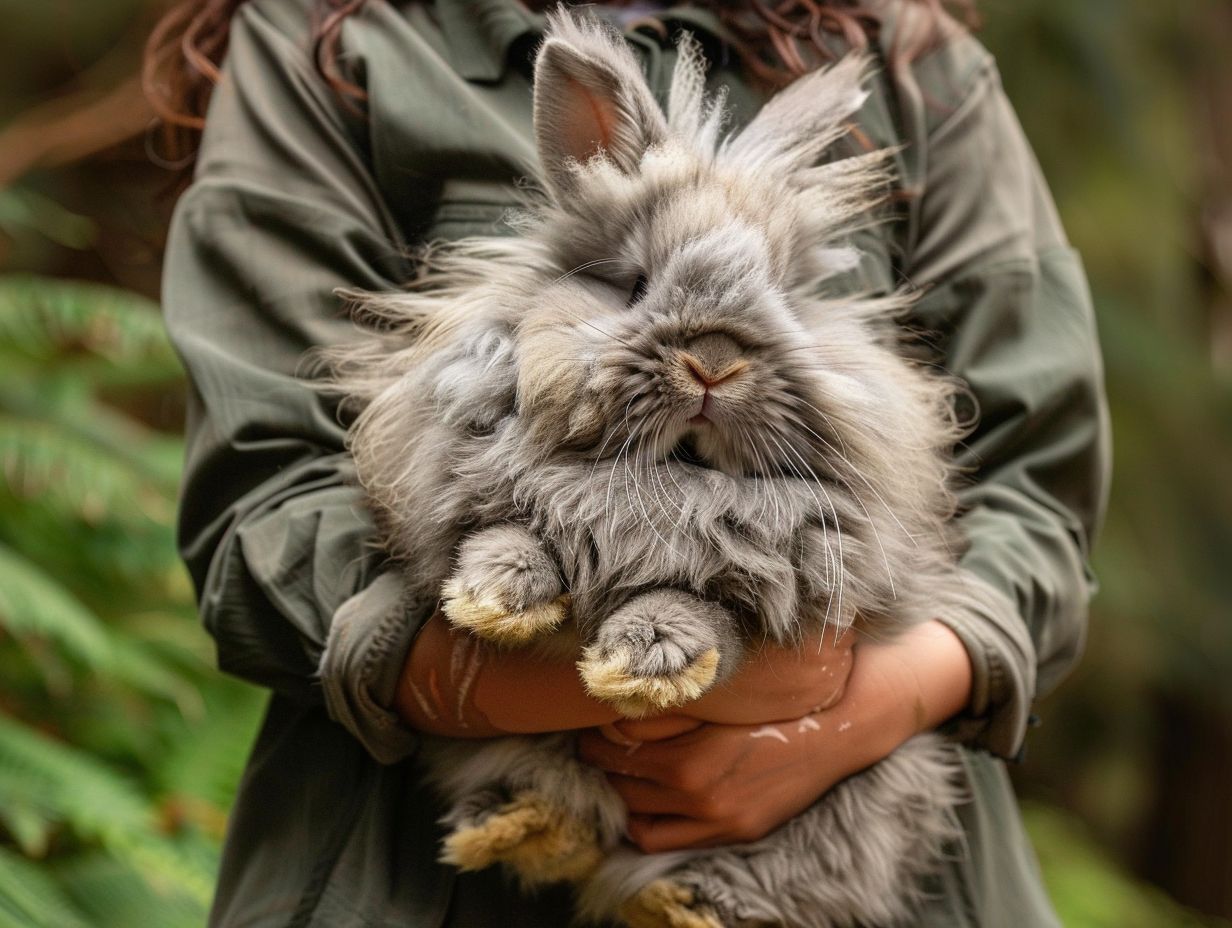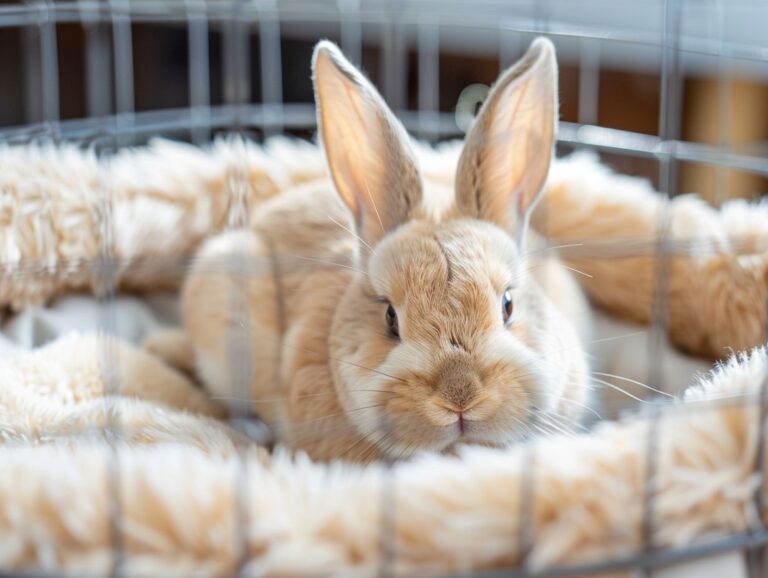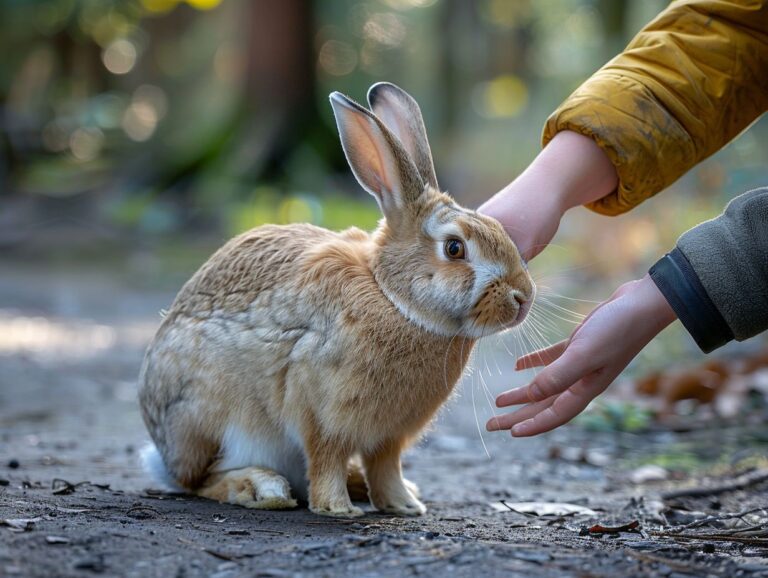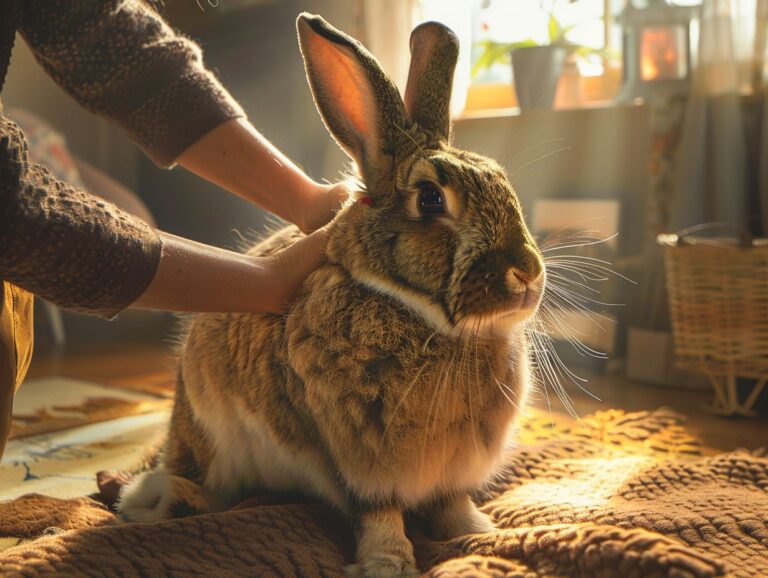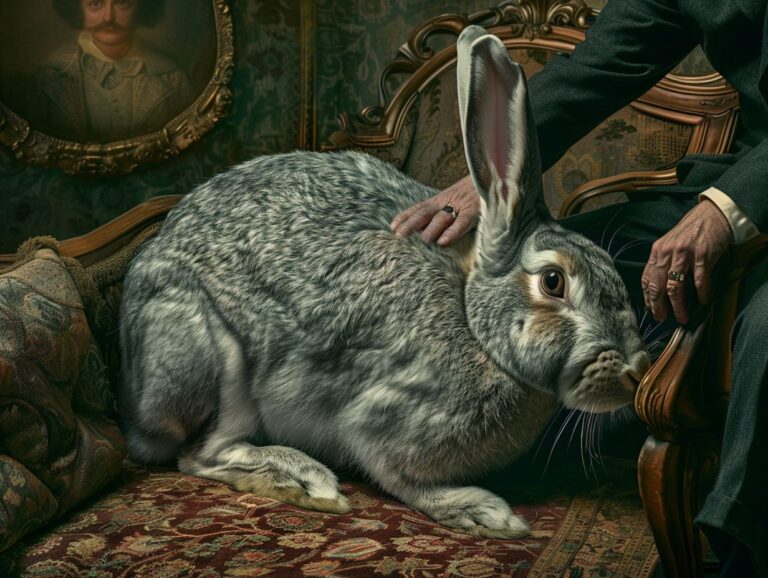Silver Fox Rabbits As Pets: Care, Diet, and Health For Large Sized Breeds
Are you considering getting a Silver Fox Rabbit as a pet?
In this article, we will explore everything you need to know about these large-sized rabbit breeds. From their average size to their ideal diet, housing requirements, grooming tips, and common health issues, we cover it all.
Whether you are a seasoned rabbit owner or considering getting a pet rabbit for the first time, this article will provide you with valuable information to ensure the well-being of your Silver Fox Rabbit.
Key Takeaways:
What are Silver Fox Rabbits?
Silver Fox rabbits are a large breed known for their striking coats and docile temperament.
They boast a distinctive dense fur that is typically black with silver-tipped guard hairs giving them a silvery sheen. This unique coloration sets them apart from other rabbit breeds. Along with their attractive appearance, Silver Fox rabbits have long, upright ears that further contribute to their elegant look.
Their calm and friendly nature makes them excellent pets, especially for families or individuals seeking a companion animal. Due to their gentle disposition, Silver Fox rabbits are easy to handle and groom, making them ideal choices for first-time rabbit owners. Breeders also value their temperament, as it makes them easier to work with and breed successfully, contributing to their popularity in the industry.
What is the Average Size of a Silver Fox Rabbit?
The average size of a Silver Fox rabbit places them within the category of large-sized breeds. These rabbits typically weigh between 9 to 11 pounds, showcasing their robust build and healthy life cycle. Their size hints at their breed’s heritage and the specific genetic traits that define them.
Silver Fox rabbits are known for their muscular bodies and well-developed skeletal structure, contributing to their substantial weight range. This breed’s weight is a key indicator of their health and vitality, reflecting proper nutrition and care. Due to their size, these rabbits require ample space and exercise to thrive physically and mentally. The Silver Fox’s weight also impacts their temperament, as maintaining a healthy weight often correlates with a balanced and contented demeanor.
What are the Different Sizes of Rabbit Breeds?
Rabbit breeds come in various sizes, ranging from small to large. Some of the large-sized rabbit breeds include the Flemish Giant, Continental Giant, Blanc De Bouscat, French Lop, and British Giant.
These magnificent creatures can reach weights up to 22 pounds and have heights of around 2 feet. The Flemish Giant, for example, is one of the largest domestic rabbit breeds, known for its gentle nature and docile temperament. Similarly, the Continental Giant has a sleek, elongated body, making it stand out among other breeds. The Blanc De Bouscat rabbit, originating from France, boasts a striking white coat adding to its allure. French Lops are distinctive for their long, floppy ears and affectionate demeanor, while British Giants, often used in agriculture, are valued for their meat production and fur quality.
Can Silver Fox Rabbits be Kept as Pets?
Silver Fox rabbits can indeed be wonderful pets due to their gentle temperament and ease of care. Their docile nature makes them suitable for households with proper living conditions and attentive care.
These rabbits are known for their friendly and sociable demeanor, often forming strong bonds with their owners. They are adaptable to various living situations, whether in a spacious backyard or a cozy indoor setting. Providing them with a balanced diet, fresh water, and sufficient exercise is crucial for their well-being. Learn more about Rhinelander rabbits as pets and their care needs.
Regular grooming is essential to maintain their striking silver fur, preventing matting and keeping them clean and healthy. Creating a safe and stimulating environment with hiding spots and toys can enhance their overall quality of life.
What are the Characteristics of Silver Fox Rabbits?
Silver Fox rabbits are characterized by their lustrous coats, dense fur, and distinctive ear size. Their large build and calm temperament make them popular choices for both breeders and pet owners. In terms of breeding, their unique genetic makeup contributes to the diversity of coat colors and patterns found within this breed.
The luxurious coat of the Silver Fox rabbit is often described as exceptionally soft and silky, with a stunning silver sheen that catches the light. The dense fur provides warmth and protection, ideal for colder climates. Their ears are notably long and erect, adding to their overall majestic appearance. These rabbits are known for their gentle and docile nature, making them excellent companions and show animals.
How to Choose a Healthy Silver Fox Rabbit as a Pet?

Selecting a healthy Silver Fox rabbit as a pet involves assessing its grooming needs, overall health, breeding history, and general care requirements. Look for signs of a shiny coat, bright eyes, and alert behavior to ensure you are choosing a robust and well-cared-for rabbit. Inquire about its breeding lineage and any specific care instructions from the breeder or seller.
When choosing a Silver Fox rabbit, proper grooming is vital to maintain their luxurious fur and overall well-being. Regular brushing and periodic baths help prevent matting and keep their coat shiny. Be sure to check for any signs of matted fur or skin issues during your inspection. Scheduling regular health checks with a veterinarian is key to identifying any potential health issues early on. Understanding the breeding background of your rabbit can provide insights into potential genetic predispositions or specific care needs.
What is the Ideal Diet for Silver Fox Rabbits?
The ideal diet for Silver Fox rabbits should consist of high-quality hay, fresh vegetables, and a balanced commercial rabbit food.
Due to their large size, these rabbits have specific nutritional needs that require a mix of fiber, vitamins, and minerals to support their growth and overall health. Providing a varied diet ensures that they receive all the essential nutrients for a thriving life. High-quality hay is crucial for their digestive health and dental wear, while fresh vegetables introduce important vitamins and minerals, promoting a strong immune system. The balanced commercial rabbit food acts as a convenient source of essential nutrients, filling in any gaps in their diet.
What are the Nutritional Needs of Large Sized Rabbit Breeds?
Large-sized rabbit breeds, such as the Silver Fox, have specific nutritional needs that cater to their size, metabolism, and overall health. A balanced diet rich in fiber, essential vitamins, and minerals is crucial for supporting their well-being and ensuring proper digestion. Regular dental care is essential for large rabbits to prevent dental issues that can arise from their dietary habits.
High-quality hay should form the foundation of a large rabbit’s diet, as it provides essential fiber necessary for gut health and dental wear. Timothy hay is a popular choice due to its optimal fiber content and low calcium levels, crucial for preventing urinary issues in larger rabbits. Alongside hay, fresh vegetables like dark leafy greens and herbs should be offered daily to provide additional nutrients and hydration. Carrots, broccoli, and parsley can be excellent choices to diversify their diet and ensure they receive a variety of essential vitamins and minerals.
What Foods Should be Avoided for Silver Fox Rabbits?
When caring for Silver Fox rabbits, it is crucial to avoid certain foods that can lead to health problems. Foods high in sugar, salt, or fat should be restricted in their diet to prevent obesity and related health issues. Toxic plants and substances must be kept away from these rabbits to ensure their well-being and longevity.
While rabbits may enjoy the occasional treat, excessive consumption of sugary foods can disrupt their digestive system and lead to obesity, tooth decay, and even diabetes. Salt, although essential in small amounts, can have harmful effects when consumed in excess, impacting their blood pressure and overall health.
Fats, while necessary for energy, can be detrimental in large quantities, contributing to heart disease and weight gain. A diet rich in fresh hay, leafy greens, and occasional fruits and vegetables is ideal for maintaining a balanced and safe nutritional intake for Silver Fox rabbits.
How to Care for Silver Fox Rabbits?
Caring for Silver Fox rabbits involves providing suitable housing that offers ample space for movement, ventilation, and protection from extreme weather conditions. Regular grooming sessions are essential to maintain their coat quality and prevent matting. Creating a clean and comfortable living environment promotes the overall well-being of these rabbits.
In terms of housing these beautiful Silver Fox rabbits, it’s crucial to choose a spacious enclosure that allows them to stretch their legs and move freely. Consider a hutch with separate sleeping and living areas to mimic their natural burrowing instincts. Provide bedding materials like hay or straw for warmth and comfort. Ensure the hutch is placed in a well-ventilated area away from direct sunlight and drafts.
Grooming is a vital aspect of caring for Silver Fox rabbits. Brush their dense fur regularly to prevent tangles and matting, especially during molting seasons. Trim their nails as needed to avoid overgrowth and potential injuries. Check their ears for any signs of dirt or parasites and clean them gently using a damp cloth. Keeping your rabbits clean and well-groomed not only enhances their appearance but also contributes to their overall health and happiness. For more information on caring for small breeds like Silver Rabbits, check out this guide.
To create a conducive environment for your Silver Fox rabbits’ health and well-being, maintain a hygienic living space. Clean their hutch regularly, removing soiled bedding and feces to prevent odors and bacterial build-up. Provide fresh water daily and ensure their food is stored in a dry and secure container to prevent contamination. Monitor their behavior and appetite regularly to spot any signs of illness or distress early on.
What are the Housing Requirements for Silver Fox Rabbits?
Silver Fox rabbits require spacious and well-ventilated hutches that accommodate their large size and provide ample room for exercise. The hutch should be secure, dry, and insulated to protect the rabbits from harsh weather conditions. Bedding materials and nesting areas play crucial roles in ensuring their comfort and well-being within the living space.
These rabbits prefer a hutch that allows them to stretch, hop, and move around freely to maintain their physical health. Proper ventilation is essential to prevent heat stress, especially during hot weather. Insulation helps regulate temperature fluctuations, keeping the rabbits cozy in colder months. In terms of bedding, choices such as straw, hay, or shredded paper provide warmth, absorb moisture, and create a soft resting spot. Nesting spaces should be secluded for privacy and safety, so rabbits can exhibit their natural burrowing behaviors.
How to Keep Silver Fox Rabbits Clean and Groomed?

Grooming Silver Fox rabbits is essential not only for their appearance but also for their well-being. Their dense fur requires extra care, so investing time in a consistent grooming routine is crucial. Consider using a gentle brush suitable for their delicate fur, and always brush in the direction of hair growth to avoid discomfort. Incorporating a healthy diet rich in nutrients can contribute to a glossy coat, making grooming even more effective.
What are the Common Health Issues for Large Sized Rabbit Breeds?
Large-sized rabbit breeds, including Silver Fox rabbits, are prone to certain common health issues that require proactive prevention measures and attentive care. Conditions such as dental problems, obesity, and gastrointestinal issues can impact their well-being. Regular health checks, a balanced diet, and a clean living environment are essential aspects of maintaining the health of these rabbits.
In terms of dental care, large rabbit breeds like the Silver Fox may experience overgrowth of their teeth, which can lead to dental malocclusion and difficulty eating. It is crucial to provide them with appropriate chew toys and fibrous foods to promote natural wear of their teeth. Monitoring their weight and diet is paramount in preventing obesity, as excess weight can strain their joints and organs, leading to further health complications.
Gastrointestinal health is another area of concern for these rabbits, as they are susceptible to conditions such as gastrointestinal stasis. Ensuring they have a diet rich in hay and greens, along with plenty of exercise, can help prevent digestive issues. The holistic care of these large breeds involves not only addressing specific health concerns but also creating a safe and stimulating environment that promotes their overall well-being.
What are the Signs of Illness in Silver Fox Rabbits?
Recognizing the signs of illness in Silver Fox rabbits is crucial for prompt intervention and effective treatment. Symptoms such as lethargy, changes in appetite, abnormal stool, or respiratory issues can indicate underlying health problems. Monitoring their behavior, physical condition, and eating habits allows caregivers to identify potential illnesses early and seek veterinary assistance when needed.
Changes in behavior, such as increased aggression, excessive grooming, or withdrawn demeanor, may also serve as indications of distress in Silver Fox rabbits. A noticeable decline in grooming habits, disheveled fur, or weight loss can be signs of health issues that require attention. Keep a close eye on their activity levels, as reduced movement or reluctance to engage in usual play can point to underlying problems.
Consistent monitoring of these factors and maintaining a well-rounded diet are keys to ensuring the health and longevity of these beloved rabbits.
What are the Preventive Measures for Health Issues in Silver Fox Rabbits?
Implementing preventive measures is key to maintaining the health and well-being of Silver Fox rabbits. Regular grooming to prevent fur matting, providing a balanced diet, and ensuring a clean living environment are essential for disease prevention. Scheduling routine veterinary check-ups and promptly addressing any health concerns contribute to proactive care management for these rabbits.
Proper grooming not only keeps the Silver Fox rabbits looking neat and tidy but also helps in preventing skin infections and parasitic infestations. When grooming, pay special attention to their dense fur to avoid matting, which can attract dirt and lead to skin issues.
A well-balanced diet rich in hay, fresh vegetables, and high-quality pellets is crucial to meet their nutritional requirements and promote overall health. Adequate water intake is also vital to prevent dehydration, especially in warmer months. For medium-sized pet rabbits, adopting a similar diet plan is essential.
Maintaining a clean living environment that includes regular cage cleaning, proper ventilation, and adequate spacing is essential to prevent the buildup of harmful bacteria and pathogens that can compromise the rabbits’ health.
Can Silver Fox Rabbits Live with Other Pets?
Silver Fox rabbits can coexist peacefully with other pets in a household, provided proper training and supervision are in place. Their docile temperament and social nature make them adaptable to living with other animals, such as dogs or cats. Introducing them gradually and monitoring their interactions can help foster positive relationships among pets.
Training Silver Fox rabbits to interact positively with other pets involves reinforcing good behavior with treats and praise. Consistency is key in establishing boundaries and teaching them how to communicate effectively with their animal companions. Supervising their interactions initially is crucial to prevent any misunderstandings or conflicts. These rabbits thrive in a calm and predictable environment, so creating a routine for all pets can help reduce stress and promote harmony within the household. For tan rabbits as pets.
Frequently Asked Questions
What is a Silver Fox Rabbit and why are they suitable as pets?

What is the proper care for a Silver Fox Rabbit?
Silver Fox Rabbits require daily grooming to maintain their thick fur and prevent matting. They also need regular exercise and playtime to keep them physically and mentally stimulated. It is important to provide a large living space with plenty of room to hop and run.
What should I feed my Silver Fox Rabbit?
Silver Fox Rabbits should have a diet consisting mainly of high-quality hay, such as Timothy hay, as well as fresh vegetables and a limited amount of pellets. It is important to avoid feeding them sugary treats or foods that are harmful to their digestive system, such as chocolate.
Should I take my Silver Fox Rabbit to the vet regularly?
Yes, it is important to take your Silver Fox Rabbit to the vet for regular check-ups and to maintain their health. Rabbits are known for hiding signs of illness, so it is important to have them checked by a professional to catch any potential health issues early on.
What health concerns should I be aware of for Silver Fox Rabbits?
Silver Fox Rabbits are susceptible to dental issues, such as overgrown teeth, as well as obesity and gastrointestinal stasis. It is important to monitor their diet and keep them physically active to prevent these health concerns.
Can I keep a Silver Fox Rabbit with other pets?
Yes, Silver Fox Rabbits are typically sociable animals and can get along well with other pets, such as cats and dogs, as long as they are properly introduced and supervised. It is important to provide a safe and secure environment for all pets to prevent any potential conflicts.

